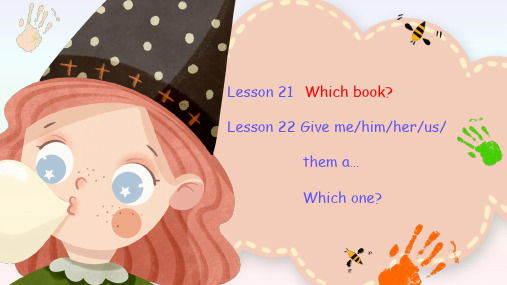新概念英语第一册第22课
- 格式:ppt
- 大小:4.17 MB
- 文档页数:25


Unit22 Watching the neighbours 观察邻居们句型与结构词课文注释:题目:Watching the neighbors —当我们watch某人或某物的时候,我们“专注地看,期望能够了解什么东西”。
图1:again —通常放在动词短语的最后。
very good friends —在一般的陈述句中复数名词前面不加冠词。
其单数形式是a very good friend(那一类中的一个)。
图2:shy 通常表示赞许,用于形容那些在社交中不主动的人。
Perhaps —可与maybe互换使用;是在对话中轮流讲话时使用的非常有用的副词,用于提出建议或进行试探性的解释。
通常放在主语前面或动词短语的最后。
Many 在表示可获得/拥有等含义的肯定性陈述句中,即在与have got和there are连用时,a lot of更常使用。
在疑问句和否定陈述句中我们用many +可数名词。
图4:He can introduce her — can -表示“可能性”;introduce Claire/her —及物动词后跟名词或代词作直接宾语。
Introduce + 宾语+ to(介词)+名词或代词宾语。
*不是introduce them her。
图6:Paul’s always busy —此处always与现在时连用,表示“永久性真理”。
在陈述句中,always放在be的后面。
在疑问句中,它放在主语的后面:Is he always…?其它:一、have got1、当用于第三人称时,have got要变成has got。
肯定句:Kate has got lots of friends here. 凯特在这里有许多朋友。
否定句:Kate hasn’t got any friends here. 凯特在这里没有朋友。
一般疑问句:Has Kate got any friends here? 凯特这里有朋友吗?肯定回答:Yes, she has. 有。

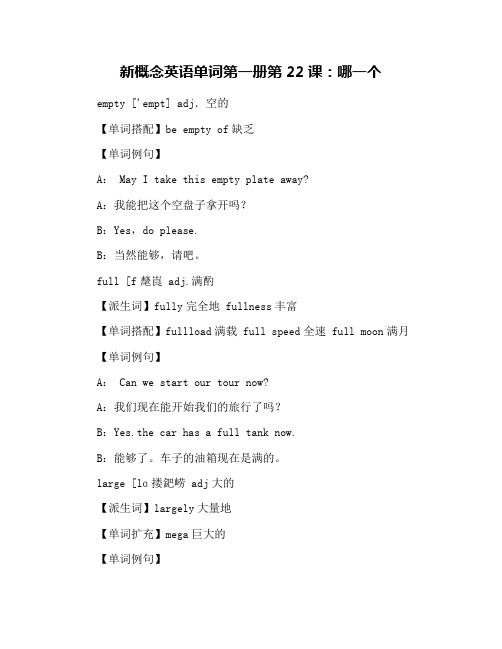
新概念英语单词第一册第22课:哪一个empty ['empt] adj.空的【单词搭配】be empty of缺乏【单词例句】A: May I take this empty plate away?A:我能把这个空盘子拿开吗?B:Yes,do please.B:当然能够,请吧。
full [f氂崀 adj.满酌【派生词】fully完全地 fullness丰富【单词搭配】fullload满载 full speed全速 full moon满月【单词例句】A: Can we start our tour now?A:我们现在能开始我们的旅行了吗?B:Yes.the car has a full tank now.B:能够了。
车子的油箱现在是满的。
large [lɑ搂鈀崂 adj大的【派生词】largely大量地【单词扩充】mega巨大的【单词例句】A: Well, here's your room, miss.A:这就是您的房间,小姐。
B: Thank you. Oh, what a nice, large room with a bird's view over the city!B:谢谢。
啊,这真是一间宽敞而且能俯瞰全城的好房间!little ['l琂()l] adj小的【单词搭配】little by little逐步地 quite a little大量【单词例句】•A: The little dog is so cute.A:这只小狗真可爱。
B: Yes, but I like that kitten more.B:是的,但我更喜欢那只小猫。
sharp[儂瀂崀 adj.尖的,锋利的small[sm氂崀小的【单词例句】A: I'm terrible at chopping vegetables.I always seem to chop them into pieces that are either too big or too small.A:找切菜的手艺很差,总是把它们切得要不就太大,要不就太小。
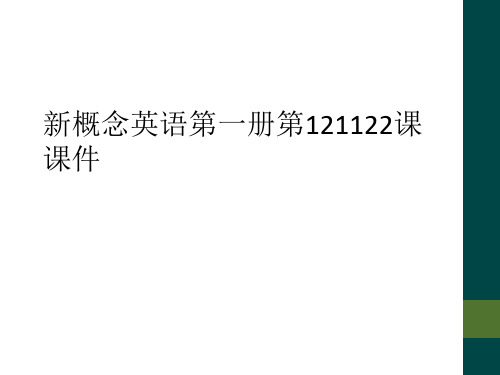
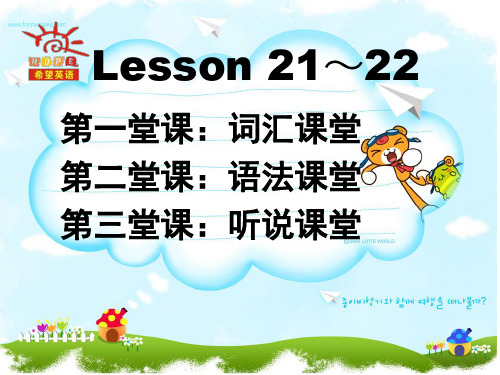

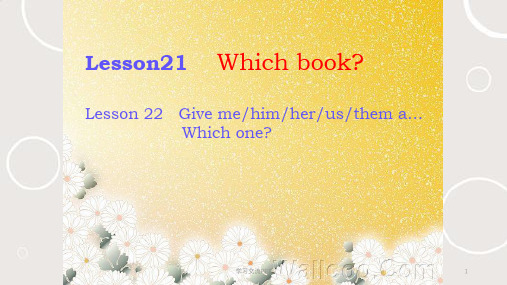
![新概念第一册22课习题[1]](https://img.taocdn.com/s1/m/d69043f604a1b0717fd5dd81.png)

新概念英语第一册第21-22课:Which book?Lesson 21 Which book?哪一本书?Listen to the tape then answer this question. Which book does the man want?听录音,然后回答问题。
这位男士要哪本书?Give me a book please, Jane.丈夫:请拿本书给我,简。
Which book?妻子:哪一本?This one?妻子:是这本吗?No, not that one. The red one.丈夫:不,不是那本。
是那本红皮的。
This one?妻子:这本吗?Yes, please.丈夫:是的,请给我。
Here you are.妻子:给你。
Thank you.丈夫:谢谢。
New Word and expressions 生词和短语givev. 给onepron.一个whichquestion word 哪一个Notes on the text课文注释Give me a book, please.这是祈使句,省略了主语you。
Which book?哪一本户这是一种省略形式。
This one?句中的one是不定代词,表示book。
复数形式是ones。
Lesson 22 Give me/him/her/us/them a... Which one?给我/他/她/我们/他们一……哪一……?New words and expressions生词和短语emptyadj.空的boxn.盒子,箱子fulladj.满的glassn.杯子largeadj大的cupn.茶杯littleadj.小的bottlen.瓶子sharpadj.尖的.锋利的tinn.罐头smalladj.小的knifen.刀子bigadj.大的forkn.叉子bluntadj.钝的spoonn.勺子Lesson 21-22 自学导读First things first课文详注Further notes on the text1.Give me a book please, Jane.请拿本书给我,简。

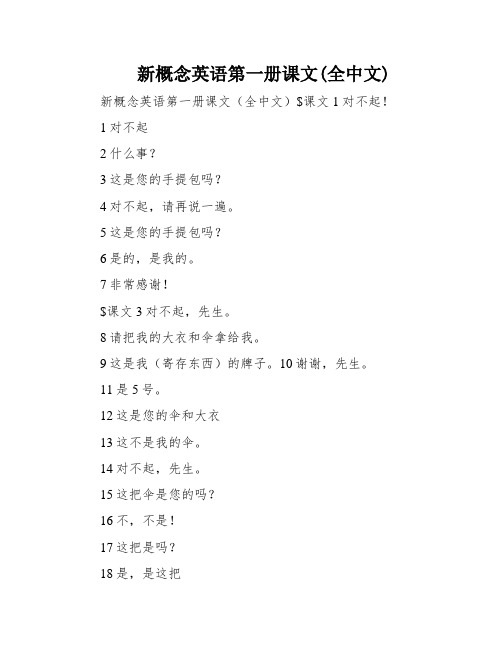
新概念英语第一册课文(全中文)新概念英语第一册课文(全中文)$课文1对不起!1对不起2什么事?3这是您的手提包吗?4对不起,请再说一遍。
5这是您的手提包吗?6是的,是我的。
7非常感谢!$课文3对不起,先生。
8请把我的大衣和伞拿给我。
9这是我(寄存东西)的牌子。
10谢谢,先生。
11是5号。
12这是您的伞和大衣13这不是我的伞。
14对不起,先生。
15这把伞是您的吗?16不,不是!17这把是吗?18是,是这把19非常感谢。
$课文5很高兴见到你。
20早上好。
21早上好,XXX先生。
22这位是XXX23XXX是个新学生。
24她是法国人。
25XXX,这位是XXX。
26他是德国人。
27很兴奋见到你。
28这位是直子。
29她是日本人。
30很高兴见到你。
31这位是XXX。
32他是韩国人。
33很高兴见到你。
34这位是XXX。
35他是中国人。
36很兴奋见到你。
37这位是XXX。
38她也是中国人。
39很兴奋见到你。
$课文7你是教师吗?40我是个新学生。
41我的名字叫XXX。
42很高兴见到你。
43我的名字叫XXX。
44你是法国人吗?45是的,我是法国人。
46你也是法国人吗?47不,我不是。
48你是哪国人?49我是意大利人。
50你是教师吗?51不,我不是。
52你是做甚么事情的?53我是电脑录入员。
54你是做什么工作的?55我是工程师。
$课文9今天好吗?56你好,XXX57你好,XXX58你今天好吗?59很好,谢谢你。
60你好吗?61很好,感谢。
62XXX好吗?63他很好,感谢。
XXX好吗?65她也很好,XXX。
66再会,XXX。
67见到你真高兴。
68我见到你也很兴奋,XXX再会。
$课文11这是你的衬衫吗?70那是谁的衬衫?71戴夫,这是你的衬衫吗?72不,先生。
73这不是我的衬衫。
74这是我的衬衫。
75我的衬衫是蓝色的。
76这件衬衫是XXX的吗?77也许是,先生。
78XXX的衬衫是白色的。
79XXX!80甚么事,师长教师。
81这是你的衬衫吗?82是的,先生。

新概念英语第一册22课听力In New Concept English Book One, Lesson 22, the listening exercise focuses on a conversation between two people discussing their preferences for different types of music. The conversation highlights the differences in taste and the reasons behind those preferences. The exercise aims to improve listening comprehension and vocabulary related to music genres and preferences.The conversation starts with one person expressingtheir love for classical music, citing its calming and soothing effect. They mention how it helps them relax and concentrate, especially when studying or working. This perspective resonates with many people who appreciate the complexity and elegance of classical music. It alsoreflects the idea that classical music can have a positive impact on one's mental state and productivity.On the other hand, the second person in the conversation expresses a preference for pop music,emphasizing its energetic and uplifting nature. They enjoy the catchy melodies and lyrics that make them feel happy and alive. This viewpoint represents a common sentiment among those who enjoy popular music for its ability touplift and entertain. It also reflects the idea that music can have a profound emotional impact on individuals, influencing their mood and overall well-being.The conversation then delves into the differences between the two genres, with one person pointing out the complexity and depth of classical music, while the other highlights the accessibility and relatability of pop music. This comparison adds depth to the discussion, showcasing the diverse qualities and appeal of each genre. It also encourages listeners to consider the various aspects of music that contribute to their personal preferences.Furthermore, the conversation touches on the cultural and historical significance of classical music, acknowledging its enduring legacy and influence. This aspect prompts listeners to appreciate the rich heritage of classical music and its enduring impact on the world ofmusic. It also encourages a deeper understanding of the historical context and evolution of different music genres.Overall, the listening exercise in Lesson 22 of New Concept English Book One provides valuable insights into the diverse world of music preferences. It encourages listeners to consider the emotional, cultural, and personal factors that shape their musical tastes. By exploring the conversation between the two individuals, listeners can gain a deeper appreciation for the wide-ranging appeal of different music genres and the reasons behind their popularity. This exercise serves as a reminder of the power of music to evoke emotions, stimulate the mind, and connect people across diverse preferences and tastes.。
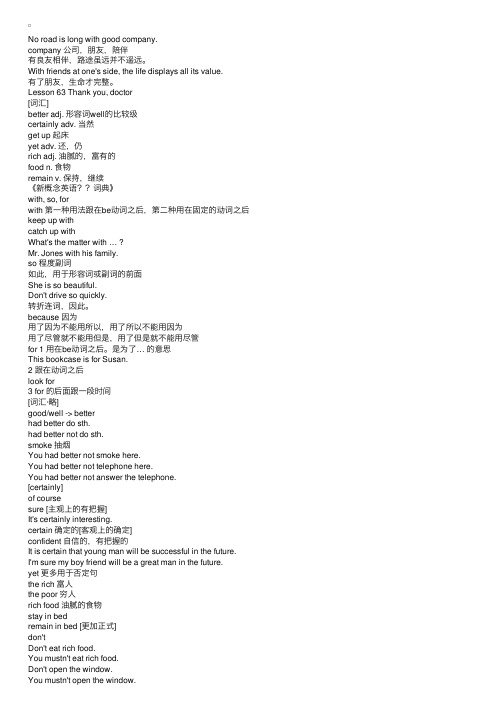
No road is long with good company.company 公司,朋友,陪伴有良友相伴,路途虽远并不遥远。
With friends at one's side, the life displays all its value.有了朋友,⽣命才完整。
Lesson 63 Thank you, doctor[词汇]better adj. 形容词well的⽐较级certainly adv. 当然get up 起床yet adv. 还,仍rich adj. 油腻的,富有的food n. ⾷物remain v. 保持,继续《新概念英语??词典》with, so, forwith 第⼀种⽤法跟在be动词之后,第⼆种⽤在固定的动词之后keep up withcatch up withWhat's the matter with … ?Mr. Jones with his family.so 程度副词如此,⽤于形容词或副词的前⾯She is so beautiful.Don't drive so quickly.转折连词,因此。
because 因为⽤了因为不能⽤所以,⽤了所以不能⽤因为⽤了尽管就不能⽤但是,⽤了但是就不能⽤尽管for 1 ⽤在be动词之后。
是为了… 的意思This bookcase is for Susan.2 跟在动词之后look for3 for 的后⾯跟⼀段时间[词汇·略]good/well -> betterhad better do sth.had better not do sth.smoke 抽烟You had better not smoke here.You had better not telephone here.You had better not answer the telephone.[certainly]of coursesure [主观上的有把握]It's certainly interesting.certain 确定的[客观上的确定]confident ⾃信的,有把握的It is certain that young man will be successful in the future.I'm sure my boy friend will be a great man in the future.yet 更多⽤于否定句the rich 富⼈the poor 穷⼈rich food 油腻的⾷物stay in bedremain in bed [更加正式]don'tDon't eat rich food.You mustn't eat rich food.Don't open the window.You mustn't open the window.Who else is in bed today? Mr. Williams.What's the matter with him? He has a bad bold too.Is Jimmy better now?Can he get up now?How long can he get up? Two hours each day.Can he go to school today?What mustn't he eat? Rich food.What must Mrs. Williams do? Keep the room warm.[课⽂]How's Jimmy today?Better. Thank you, doctor.Can I see him please, Mrs. Williams?Certainly, doctor. Come upstairs.You look very well, Jimmy.You are better now, but you mustn't get up yet.You must stay in bed for another two days.The boy mustn't go to school yet, Mrs. Williams.And he mustn't eat rich food.Does he have a temperature, doctor?No, he doesn't.Must he stay in bed?Yes, he must remain in bed for another two days.He can get up for about two hours each day, but you must keep the room warm. Where's Mr. Williams this evening?He's in bed, doctor.Can you see him please?He has a bad cold, too!Where is Jimmy's bedroom? Upstairs.Where is Mr. Williams now? He is in bed.Does Jimmy have a temperature?What must Jimmy do today? Jimmy must stay in bed and mustn't eat rich food. Can Jimmy get up? How long? Two hours each day.How is Jimmy?come upstairs 上楼You look very well Jimmy.You are better now.yet ⽤于否定句中another two days 另外两天The boy mustn't go to school.mustn't eat rich foodhave a temperature 发烧remain in bedeach dayevery 指三个或三个以上的每⼀个,强调⼤家⼀起each 指两个或两个以上中的每⼀个,强调逐个,单个The final examination is coming, each of you has to talk to me.each side of the street 街道的两边He can get up for about two hours each day, but you must keep the room warm. paint it pinkLesson 64 Don't … You mustn't …[词汇]play v. 玩match n. ⽕柴talk v. 谈话library n. 图书馆drive v. 开车so adv. 如此地quickly adv. 快地lean out of ⾝体探出break v. 打破noise n. 喧闹声Written exercises 书⾯练习 B page 128aspirin 阿斯匹林play with matches 玩⽕柴make a noise 发出噪⾳lean out of the window 把⾝体探出窗外take any aspirinstake this Medicinecall the doctorplay with matchestalk in the librarymake a noisedrive so quicklylean out of the windowbreak that vaseWritten exercises 书⾯练习 A page 128I mustn't take any aspirins.Jimmy mustn't take any aspirins.1 Jimmy is better now but Jimmy mustn't get up yet.2 Jimmy has a cold and Jimmy must stay in bed.3 Jimmy can get up for two hours each day.4 Jimmy often reads in bed.5 Jimmy listens to the stereo, too.6 Jimmy doesn't feel ill now.Lesson 65 Not a baby[词汇]Dad n. 爸(⼉语)key n. 钥匙 adj.关键的baby n. 婴⼉hear v. 听见enjoy v. 玩得快活yourself pron.你⾃⼰ourselves pron.我们⾃⼰mum n. 妈妈hear 听见 [iE] hair 头发 [ZE]myself pron. 我⾃⼰themselves pron. 他们⾃⼰himself pron. 他⾃⼰herself pron. 她⾃⼰keyboard 键盘key words 关键的话语key point 关键点the key to the doorthe key to the front doorwant 想要want to do sth.go abroad 出国next year 明年I want to go abroad next year.helpShe wants to help you.I am going to see my friends.I can't arrive Home at ten o'clock.I want to have the key to the front door.Jill wants to have the key to the front door.Can I have the key to the front door?the key to the front doorlisten 听listening 听⼒listen tohear from sb. 收到某⼈的来信I hear from my mother every week.hear of 听说Can you hear?Do you hear? 你听见了吗?speak 讲话Do you speak English?enjoy sth.enjoy oneselfenjoy doing sth.music ⾳乐I like music.I enjoy music.I like you.I enjoy you.[⼀般不合⽤]always 总是I always enjoy myself.They always enjoy themselves.Jill always enjoys herself.I enjoy reading.要加-ing的动词mind, finishmind doing sth.finish doing sth.[词汇·略]come Home [在家,谈及回家]get Home 到家[不论在家与否]be Home 在家go Home 回家[在外]arrive Home 到家[⽐较正式]I come Home at six o'clock every day.I get Home very early every day.I can't get Home so early.The children come Home from school at five o'clock. Mr. Smith come Home from work at six o'clock.I can't get Home so early.You must be Home.let’sLet's go Home.I arrive Home at seven o'clock.But my brother arrives Home at six o'clock.after a quarter past elevenYou must be Home at half past ten.I can get Home at half past ten.Jill is eighteen years old.meet some friendsJill is going to meet some friends.She usually comes Home early.But she can't get Home so early today.So she wants to have the key to the front door.Can I have the key to the front door?No, you can't.Jill is eighteen years old, she is not a baby.give her the keygive the key to hera quarter past elevenafter a quarter past elevenYou mustn't come Home after a quarter past eleven. Jill always enjoys herself.[课⽂]What are you going to do this evening, Jill?I'm going to meet some friends. Dad.You mustn't come Home late.You must be Home at half past ten.I can't get Home so early, Dad!Can I have the key to the front door please?No, you can't.Jill's eighteen years old, Tom.She's not a baby.Give her the key.She always comes Home early.Oh, all right!Here you are.But you mustn't come Home after a quarter past eleven. Do you hear?Yes. Dad.Thanks, Mum.That's all right.Goodbye.Enjoy yourself!We always enjoy ourselves, Mum.Bye-bye.every yearnext weeklast yearlast weekthis yearlast Fridayeighteen-year girlgive the key to herwelcome 欢迎You are welcome. 不⽤谢That's ok.Enjoy yourself!I always enjoy myself.We are enjoying ourselves.They are enjoying themselves.He's enjoying himself.She's enjoying herself.have a good timeWritten exercises 书⾯练习 A page 1321 at2 in3 from, from4 in5 in6 in, ina quarter past onea quarter to fourtwo o'clockhalf past onea quarter past threehalf past twohalf past threethree o'clocka quarter past twoa quarter to twoa quarter to three1 She must go to the library at a quarter past one.2 We must see the dentist at a quarter to four.3 I must type this letter at two o'clock.4 They must see the boss at half past one.5 George must take his Medicine at a quarter past three.9 They must come Home at a quarter past two.。
